Stay ahead of the curve as a political insider with deep policy analysis, daily briefings and policy-shaping tools.
Request a DemoBill adds violation to Soil Amendment Act, but will it stop the stench?

Gov. Brian Kemp signs HB 1223. (Credit: Office of Gov. Kemp)
After years of enduring intrusive, foul-smelling waste spread on untold tracts of rural land, Georgians living near such sites are finally getting some relief.
On Monday, Gov. Brian Kemp signed into law a bill that adds a new violation to the state’s 48-year-old Soil Amendment Act. Soil amendment is meant to help farmers create healthier soil.
The law’s new provision is being hailed as a small but significant breakthrough in a 15-year battle to rein in abuses and mismanagement and create more safeguards and oversight in the disbursement of soil amendment. Many rural communities have long complained that the state-approved, sludge-like substance smells like “rotting corpses,” draws flies and vultures, and has led to other environmental problems.
Soil amendment is a state-approved additive derived from waste created mostly at chicken-processing and pet food-processing plants. It’s intended to be used as fertilizer on farmland where crops are grown. It’s supposed to help reduce erosion, improve water retention, change soil pH, pump up nutrients and provide other soil-boosting enhancements. Georgia law allows chicken processing waste to be applied to land as a soil amendment. Some farmers use it as a cheap alternative due to the rising cost of fertilizer.
The new provision, which goes into effect July 1, makes it illegal for a company to continue spreading soil amendment if the company or the site in which the waste is being distributed is under some kind of enforcement action from the state Environmental Protection Division or the state Department of Agriculture, the bill’s sponsor Rep. Rob Leverett, R-Elberton, told State Affairs Monday. Violators must be notified by the agriculture department and must resolve the prior problem before they can resume dispersing more soil amendment, he added.
“I’m very excited. I appreciate the governor signing the bill,” said Leverett who lives in Elbert County where some residents have had problems with soil amendment. “The passage of the bill indicates there’s some recognition by the Legislature that we do need to take a look at this. What I’m trying to do is address what I believe to be legitimate complaints. Hopefully, we started to do that this year and we’ll take other incremental steps as needed. I look forward to the Ag department enforcing this new violation once it’s gone through their regulatory process.”
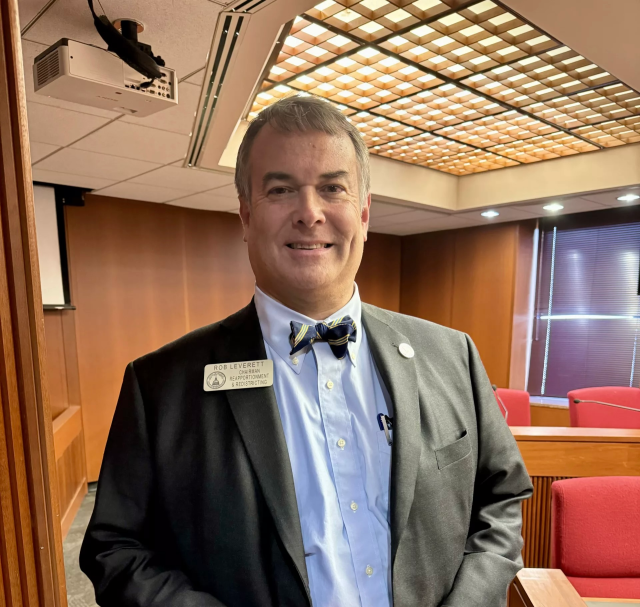
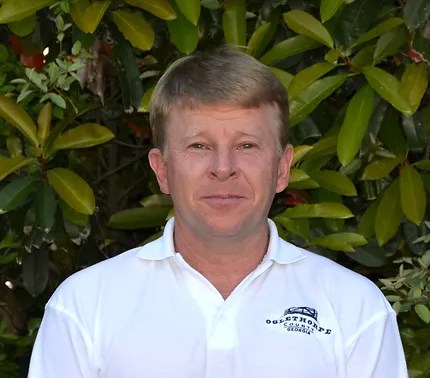
David vs Goliath
In a state where agriculture wields tremendous power — it provides paychecks for 1 in 7 Georgians and contributes about $75 billion a year to the state’s economy, most of it from poultry processors — the new legislation is a milestone, local government officials and activists say.
“It is a very big step,” Tonya Bonitatibus, executive director and riverkeeper at the environmental nonprofit Savannah Riverkeeper, told State Affairs. “This bill made it through the Senate and the House Ag committees, which are traditionally definitely not in the business of overregulating Ag, and it passed almost unanimously [in the Legislature] and that speaks volumes.” Bonitatibus has been tracking the issue for 13 years.
While state lawmakers are recognizing the harsh impact the state’s poultry industry waste is having on some rural communities, leaders in those communities are waiting to see what the Georgia Department of Agriculture does. The department has sole power to regulate soil amendment.
“I hope the new [agriculture] commissioner Tyler Harper brings us more positive results,” said Oglethorpe County Commission Chair Jay Paul, a former state Environmental Protection Division specialist who dealt with soil amendment most of his 17 years with the agency. “I’m trying to give him the benefit of the doubt.”
Shortly after taking office in January 2023, Harper vowed to review the department’s Soil Amendment Program. Since then, he has issued recommendations and is beefing up the program, which when he arrived had only two people, one of whom was the inspector for the entire state. With $550,000 in funding from the state, Harper has added two more inspectors, a program manager and an attorney.
The department is updating its software so inspection reports can be completed digitally and tracked online rather than hand-written. It’s also updating its licensing and registration software to help registrants more easily comply with soil amendment program rules.
“Our team has done a really good job,” Harper told State Affairs. “We’ve really been working to get our arms around it since I walked in the door last year, and we’ve been committed to addressing the issue and ensuring that the agricultural industry can be successful and that we’re protecting our state, our resources and the public all at the same time.”
Rep. Robert Dickey, chairman of the House Agriculture Committee said Leverett’s bill is “about the [state agriculture] department having some teeth in the rules and law to really shut down” companies with abusive soil amendment practices.
The Ag department’s recent efforts are more than what’s been done in the past, critics say, but more needs to be done.
“I really haven’t seen a whole lot of difference. I mean, we’ve heard some good rhetoric,” Wilkes County Commission Chairman Sam Moore told State Affairs.
“Unfortunately, it’s the little bitty counties against the Department of Ag. And we lose every time,” Elbert County Commission Chairman Lee Vaughn said. “The Department of Ag has 100% control over what soil amendments are and what they allow and how they allow them to be applied.”
Local leaders in counties affected by the sludge onslaught say they’ve been kept in the dark for years about soil amendment. To make matters worse, they say they have no regulatory authority to resolve the problem because that’s left up to the state agriculture department.
“We want to know where it’s going. We want to know what it is,” Moore said. “I mean, we don’t even know if they [sludge-hauling companies] have a permit or not. You call the Department of Ag and they act like they don’t know. It’s just the same old thing that’s been going on for years.”
In the last year, some counties have started fighting back, creating local ordinances that discourage the sludge haulers from coming into their communities. At the same time, the problem has sparked activism among local residents in several counties where the problem prevails.
‘Death and Diarrhea’
State Affairs spoke to local government officials, activists, environmentalists, farmers and residents in a half dozen counties where soil amendment has been applied for years. Their stories all seem to align.
They talked about how their communities have been overrun with tractor-trailers hauling millions of gallons of sludge — or as locals call it “chicken blood and guts” — presumably from chicken and dog-food processing plants. The additive is being spread on open land in rural communities — usually small, sparsely-populated counties — across Georgia, with little state regulation, scrutiny or intervention.
The companies bringing in the waste have contracted with or paid farmers or landowners to apply it on their property. Some locals report seeing dozens of tanker-trucks a day hauling the waste into their communities. It’s an endless procession where the sludge is applied throughout the day, all hours of the night and even in the rain.
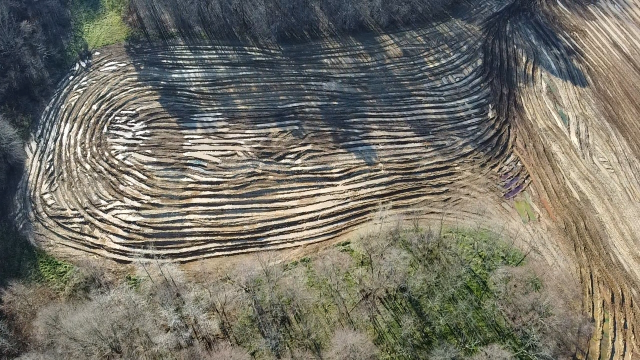
The usual hoot owls and honey bees have been replaced by vultures and flies, community members say. Millions of flies land on farm animals and get entangled in children’s hair when they play outdoors. In Hancock County, locals have resorted to firing shotguns in the air to scare away the vultures perched atop churches and other buildings. The vultures feast on the land where the soil amendment has been deposited.
“Buzzards or vultures, whatever you want to refer to them as, eat dead rotting flesh,” said Angela Walden who lives in Jefferson County, 45 minutes south of Augusta.
Dirt roads have become muddy, well-worn crevices as dozens of tanker trucks haul tons and of the liquid ooze into communities nonstop.
In most instances, the sludge is spread on top of the soil, locals and officials say, instead of injected into the ground, as the state requires, creating a horrific stench that stretches for miles.
“It smells like death and diarrhea,” said Patrick Dragos, a former Seattle ironworker who moved his wife and daughter to Jewell in August 2022. The family owns an historic wedding venue on a 42-acre estate with an 1895 Victorian home and barn near the Ogeechee River.
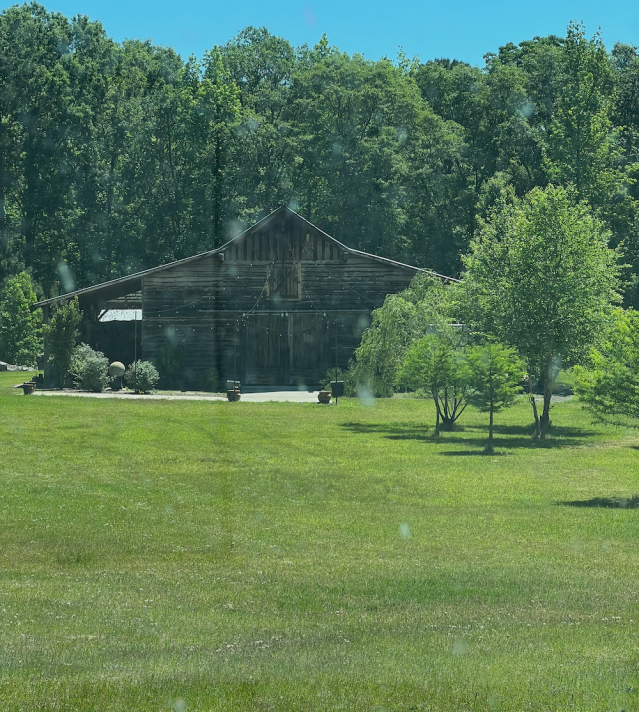

Dragos was so incensed after getting nowhere with state and local officials and the sludge-hauling companies that he is now running for chairman of Hancock County Board of Commissioners. The 34-year-old Republican is running against three Democrats, including the incumbent Helen “Sistie” Hudson who has held the seat since 2016.
“If they’re not going to handle our issues and take this seriously, I guess I’m going to have to do it myself,”Dragos said.
Problems began near the Dragos family’s Hancock County property in March 2023 when soil amendment was applied to a farm about a mile away. The smell and flies continued through October, leading Dragos to believe the problem was over. Then, the sludge-filled trucks returned in March of this year and have shown up frequently since then.
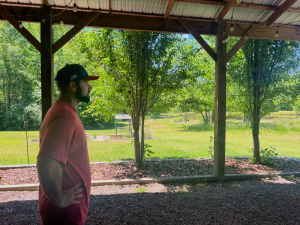
The family’s heading into a busy season of weddings, graduations and baby showers and never know when the trucks and smell will show up.
“The threat of the smell and flies is constant. So that stress is always there,” Dragos told State Affairs.
Dragos worries that nonstop application of the soil amendment may eventually seep into the water tables and eventually his well water.
It’s already created one environmental mishap.
In July 2022, some 1,700 fish died in the Little River in Wilkes County after soil amendment runoff from Mar-Leta Farms leached into the river, a Georgia Environmental Protection Division report found. The waste came from washdown water at a Hartwell County Nestle Purina facility provided by a company called Proponic Solutions, according to the EPD report. The report described the waste as “grey, turpid wastewater.” Mar-Leta, also known as McAvoy Farms, was later fined $85,000.
“It’s a major environmental concern,” said Paul, the Oglethorpe County Commission chairman. “And I’m not convinced that the fish kill in Wilkes County will be the last one because nobody really knows what’s in it. It’s just that simple. It comes as wastewater and suddenly goes on a truck and it becomes soil amendment.”
Fighting Back
Unable to get much help from the state agriculture department for years, some counties have taken steps to deal with the problem themselves:
In Warren County, companies wanting to apply soil amendment have to notify the county and get a permit to do so, Commission Chairman John Graham said. The companies also are limited to storing the sludge in certain industrial areas of the county and onsite for no more than 12 hours.
The ordinance was put in place about a year ago so that county officials “ would have more knowledge of what’s going on,” Graham said. “We’re going to stand on our ordinance. Our attorney put it together and he said he followed everything [based on the law]. He feels like we did the right thing.”
The issue had become such a problem that the county was forced to close one dirt road because “they had brought so many tanker-trucks of that stuff in, it messed up the dirt road. With all the rain we’ve had and them bringing in 20 trucks a day and that weight on a muddy dirt road just ruined it,” Graham said, adding that activity has “slowed down in the last little while,” Graham added.
Oglethorpe County created an ordinance last June that requires companies applying soil amendment on a tract of land to be at least 100 feet away from the property line of the nearest private property. During the 2021-22 legislative session, Senate Bill 260, sponsored by then-Sen. Tyler Harper, limited local buffers and setbacks to 100 feet.
“If we get a complaint, we will at least go out there and walk the perimeter of a property and make sure they’re not within 100 feet,” Paul said. “If we see something more egregious, like septage [human waste] for example, we can turn it over to the George Environmental Protection Division. It [Oglethorpe’s ordinance] does give us something new but that’s about it.”
Probably the strongest local government push back comes from Wilkes County. Two months ago, county leaders adopted an ordinance that requires landowners to prove they’re using the land where soil amendment is being applied to grow products, not just as a dumping ground. One soil amendment-application company sued the county two weeks ago saying the ordinance is illegal.
“Who knows what’s going to happen,” Moore, the Wilkes County Commission chairman, said when asked about the county’s chances of winning. “You would think we’d have a good chance. [But] We’ve been dealing with the state for so long, our expectations are not real high.”
Accidental Activists
The ongoing sludge fight has also created a motley mix of NIMBY activists.
Angela Walden and her husband had plans to build their dream home on their family’s nearly 200-year-old farm in Jefferson County. Those plans died on July 13, 2022 when they got the first whiff of a mysterious sludge that had been spread on her cousin’s farm across the two-lane highway dividing their properties.
A month later, Walden’s husband, who often tended the family farm after working his day job, got sick. He was vomiting. He had a sore throat, watery eyes and headaches. He was ultimately diagnosed with thyroiditis, a condition that occurs after coming in contact with hazardous toxins. That was the beginning of the Summer of Hell — 69 days of stomach-churning stench and flies — for Walden and her family.
It was also Walden’s swift induction into activism that would take her to the state Capitol to fight against the substance that ultimately caused a family rift that continues to this day.
“It’s small town, rural Georgians up against big industry,” said Walden, who has appeared in a Rural Georgia Protection Alliance documentary about soil amendment. “The chicken industry is big in our state. You’re going up against them, these lobbyists who have millions of dollars and big time attorneys. And you have the politicians. If I can just inform my county, my residents about what this really is and to try to keep it out of my community … that’s the best way to combat it.”
Walden wants to see regulatory authority over soil amendment removed from the state agriculture department and returned to the state’s Environmental Protection Division.
“That would be a huge win,” she said. “You know, we have to do what we can to try to bring some regulation and some oversight to what they’re doing.”
Have questions? Contact Tammy Joyner on X @lvjoyner or at [email protected].
Professionals still face licensing delays amid state’s transition to online system
The Gist Georgia’s professionals and business owners are still struggling to obtain professional licenses in a timely manner. As the Secretary of State’s Office rolls out its new Georgia Online Application Licensing System to expedite the process, the efficiency of this new process is being put to the test. What’s Happening Thursday morning at the …
Controversy over AP African American Studies class grows
Rashad Brown has been teaching Advanced Placement African American Studies at Atlanta’s Maynard Jackson High School for three years. He’ll continue to do so — even though the state’s top education official removed it from the list of state-funded course offerings for the upcoming school year. While Brown prepares to start teaching his class on …
Students, teachers, lawmakers blast decision to end AP African American history classes
ATLANTA — A coalition of lawmakers, civil rights leaders, clergy, educators and students Wednesday called on the state’s education czar to rescind his decision to drop an advanced placement African American studies class from the state’s curriculum for the upcoming school year. “This decision is the latest attack in a long-running GOP assault on Georgia’s …
Kamala Harris’ presidential bid reinvigorates Georgia Democrats
Georgia Democrats have gained new momentum heading into the November election, propelled by President Joe Biden’s decision to bow out of his reelection bid and hand the reins to Vice President Kamala Harris. The historic decision, announced Sunday, is expected to prove pivotal in the national and state political arenas and breathe new life and …




